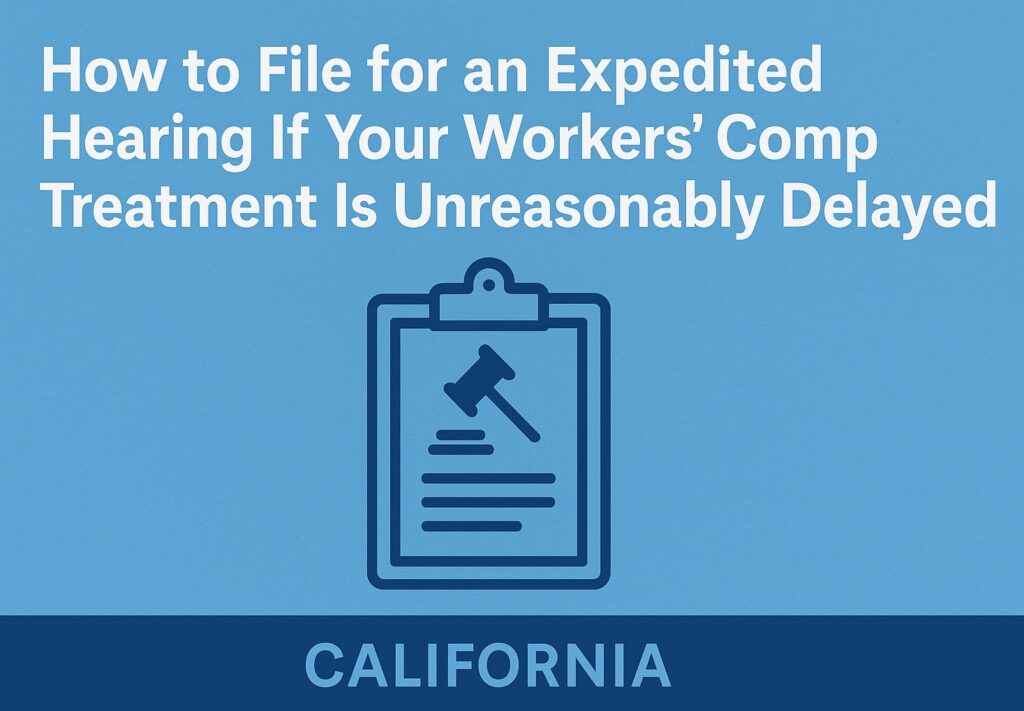
If you’re injured at work and your medical treatment is being delayed or denied, you may not have time to wait for the normal workers’ comp process to play out. Fortunately, California law allows injured workers to request an expedited hearing before a judge when delays threaten their health, recovery, or legal rights.
At Employees First Labor Law, we regularly help clients fast-track urgent disputes—especially when insurance companies stall on approving necessary care. Here’s what you need to know about expedited hearings, when to request one, and how to file.
What Is an Expedited Hearing in Workers’ Comp?
An expedited hearing is a fast-tracked court proceeding before a workers’ compensation judge at the Division of Workers’ Compensation (DWC). Unlike a standard hearing—which may take months to schedule—an expedited hearing is typically held within 30 days of filing your request.
Expedited hearings are used for urgent disputes, such as:
- Unreasonable delays in medical treatment
- Denial of surgery or specialist referrals
- Termination of temporary disability payments
- Issues that threaten immediate harm to the injured worker
The goal is to resolve time-sensitive problems quickly so the injured worker can get the care or benefits they need without waiting months for a trial.
Legal Basis for Expedited Hearings
California Labor Code § 5502(b) provides the right to an expedited hearing when there are disputes over:
“entitlement to medical treatment… where the employee would suffer irreparable harm or immediate and serious injury if the hearing is not held promptly.”
This includes treatment delays that threaten your recovery, worsen your condition, or violate your legal right to timely care.
📖 Related: What Medical Treatment Is Covered in Workers’ Comp?
Examples of Treatment Issues That May Qualify
Expedited hearings are appropriate when the delay is:
- Jeopardizing your health (e.g., denied surgery for a worsening injury)
- Preventing you from returning to work
- Causing unnecessary pain or suffering
- A violation of Utilization Review (UR) timelines
Examples:
- Physical therapy approved by your treating doctor is delayed for weeks
- Diagnostic tests like MRIs or X-rays are denied or ignored
- Medication for pain or infection is not authorized promptly
How to File for an Expedited Hearing
Here’s a step-by-step guide to filing for an expedited hearing in California:
Step 1: Fill Out the Required Forms
You must file the following with the DWC:
- Declaration of Readiness to Proceed (DOR) – Expedited Hearing
(Form DWC-AD 9) - Supporting medical records or a doctor’s report showing treatment is necessary and urgent
📌 Tip: Make sure the DOR clearly states the urgent nature of your dispute (e.g., “Surgery denied despite treating physician’s authorization”).
Step 2: Serve the Other Side
You must send a copy of your DOR to:
- The claims administrator/insurance company
- Their attorney (if represented)
Use proof of service form DWC-POC and submit it with your DOR.
Step 3: File with the Correct DWC District Office
File the completed forms with the DWC district office where your case is assigned. You can submit in person, by mail, or sometimes electronically.
📍 Find your DWC office here: https://www.dir.ca.gov/dwc/DWC_address/DWC_office_locator.htm
Step 4: Attend the Expedited Hearing
You’ll be scheduled for a hearing—usually within 30 days. A workers’ compensation judge will review your case and can issue a decision requiring the insurance company to authorize treatment.
Why Legal Help Matters
Filing for an expedited hearing involves strict forms, deadlines, and medical evidence. Insurance companies often fight back hard at these hearings, using procedural defenses and delay tactics.
An experienced workers’ comp attorney can:
- Prepare the DOR and medical documentation correctly
- Represent you at the hearing and present evidence
- Push for penalties if the insurer acted in bad faith
At Employees First Labor Law, we take over the process for our clients and fight aggressively to force treatment approvals when insurance companies play games.
Summary: Don’t Let the Insurance Company Delay Your Recovery
If your treatment is being unreasonably delayed, you don’t have to wait in pain or uncertainty. California law gives you the right to file for an expedited hearing and fight for timely medical care.
Key Points:
- Use an expedited hearing when delays threaten your health or cause hardship
- File a Declaration of Readiness (DOR) and submit supporting medical records
- The DWC will schedule a hearing within ~30 days
- Legal help can significantly increase your chances of success

Need Help? We’ll File the Hearing For You.
Don’t navigate the system alone. At Employees First Labor Law, we’ve helped thousands of injured California workers fight delays and force treatment approvals.
📱 Contact us today for a free consultation—let us hold the insurance company accountable and get your treatment back on track.
Contact EFLL for a free consultation today.
We’ll fight to get your treatment approved and ensure your recovery isn’t left in the hands of an adjuster.



